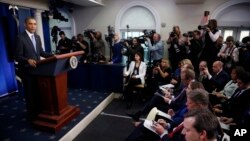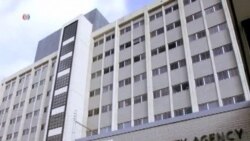WHITE HOUSE —
In an end-of-year news conference, President Barack Obama discussed U.S. electronic surveillance by the National Security Agency, the recent budget deal between Democratic and Republican lawmakers, the flawed rollout of his health care reform law, his low approval ratings, and nuclear talks with Iran.
Obama began by pointing to news he says bodes well for 2014 - that the U.S. economy grew at a 4.1 percent pace in the third quarter of the year, the strongest in nearly two years, with unemployment the lowest in five years.
"More Americans are finding work and experiencing the pride of a paycheck. Our businesses are positioned for new growth and new jobs. And I firmly believe that 2014 can be a breakthrough year for America," said the president.
He said more work is needed to provide better opportunities for middle-class Americans, adding that he hopes Washington will not be "condemned to endless gridlock" in 2014.
Obama provided a summary of accomplishments, and work still to be done, overseas.
"This year we have demonstrated that with clear-eyed principled diplomacy, we can pursue a new path to a world that is more secure, a future where Iran does not build a nuclear weapon, a future where Syria's chemical weapons stockpiles are destroyed," said Obama.
The interim deal between the United States and other permanent members of the United Nations Security Council, plus Germany, provides Iran with limited sanctions relief in exchange for halting parts of its nuclear program.
Obama appealed again to U.S. lawmakers not to pass legislation imposing new sanctions on Iran, which he has threatened to veto, while a final nuclear deal is negotiated in coming months.
"It's not going to be hard for us to turn the dials back, strengthen sanctions even further. I'll work with members of Congress to put even more pressure on Iran. But there is no reason to do it right now," he said.
Another major issue was NSA surveillance, and 46 recommendations from a special panel formed after revelations by former NSA contractor Edward Snowden.
Obama declined to directly comment on Snowden, who faces felony charges, or to suggestions that Snowden, who received temporary asylum from Russia, receive amnesty.
He said there was another way, however, to have a debate about U.S. intelligence capabilities besides the method Snowden chose. "As important and as necessary as this debate has been, it is also important to keep in mind that this has done unnecessary damage to U.S. intelligence capabilities and to U.S. diplomacy."
He said Americans are "rightly concerned about the possibility of misuse" of the data that the National Security Agency is collecting.
He said the spy programs have to balance the country's need to protect itself against the need to protect Americans' civil liberties and privacy. NSA has collected a vast storehouse of data about Americans' phone calls - the numbers they have called, the time and length of the calls.
"We need this intelligence," Mr. Obama said. "We can't unilaterally 'disarm.'"
But he said the surveillance programs are "only going to work if the American people have trust" in them.
Obama will speak to Americans and the world in January, likely before his State of the Union address, about his decisions on surveillance policy.
Asked if 2013 was the worst year of his presidency, Obama said "that is not how I think of it," but acknowledged that health care reform problems contributed to his current low approval ratings.
"My polls have gone up and down a lot through the course of my career. I mean if I was interested in polls, I wouldn't have run for president," he said.
He also looked ahead to the planned withdrawal of the last U.S. troops from Afghanistan by the end of 2014, and he said the U.S. remains vigilant to protect against terrorist attacks.
After the hour-long news conference, he was asked what his new year's resolution would be, and replied, "to be nicer to the White House press corps."
Obama began by pointing to news he says bodes well for 2014 - that the U.S. economy grew at a 4.1 percent pace in the third quarter of the year, the strongest in nearly two years, with unemployment the lowest in five years.
"More Americans are finding work and experiencing the pride of a paycheck. Our businesses are positioned for new growth and new jobs. And I firmly believe that 2014 can be a breakthrough year for America," said the president.
He said more work is needed to provide better opportunities for middle-class Americans, adding that he hopes Washington will not be "condemned to endless gridlock" in 2014.
Obama provided a summary of accomplishments, and work still to be done, overseas.
"This year we have demonstrated that with clear-eyed principled diplomacy, we can pursue a new path to a world that is more secure, a future where Iran does not build a nuclear weapon, a future where Syria's chemical weapons stockpiles are destroyed," said Obama.
The interim deal between the United States and other permanent members of the United Nations Security Council, plus Germany, provides Iran with limited sanctions relief in exchange for halting parts of its nuclear program.
Obama appealed again to U.S. lawmakers not to pass legislation imposing new sanctions on Iran, which he has threatened to veto, while a final nuclear deal is negotiated in coming months.
"It's not going to be hard for us to turn the dials back, strengthen sanctions even further. I'll work with members of Congress to put even more pressure on Iran. But there is no reason to do it right now," he said.
Another major issue was NSA surveillance, and 46 recommendations from a special panel formed after revelations by former NSA contractor Edward Snowden.
Obama declined to directly comment on Snowden, who faces felony charges, or to suggestions that Snowden, who received temporary asylum from Russia, receive amnesty.
He said there was another way, however, to have a debate about U.S. intelligence capabilities besides the method Snowden chose. "As important and as necessary as this debate has been, it is also important to keep in mind that this has done unnecessary damage to U.S. intelligence capabilities and to U.S. diplomacy."
He said Americans are "rightly concerned about the possibility of misuse" of the data that the National Security Agency is collecting.
He said the spy programs have to balance the country's need to protect itself against the need to protect Americans' civil liberties and privacy. NSA has collected a vast storehouse of data about Americans' phone calls - the numbers they have called, the time and length of the calls.
"We need this intelligence," Mr. Obama said. "We can't unilaterally 'disarm.'"
But he said the surveillance programs are "only going to work if the American people have trust" in them.
Obama will speak to Americans and the world in January, likely before his State of the Union address, about his decisions on surveillance policy.
Asked if 2013 was the worst year of his presidency, Obama said "that is not how I think of it," but acknowledged that health care reform problems contributed to his current low approval ratings.
"My polls have gone up and down a lot through the course of my career. I mean if I was interested in polls, I wouldn't have run for president," he said.
He also looked ahead to the planned withdrawal of the last U.S. troops from Afghanistan by the end of 2014, and he said the U.S. remains vigilant to protect against terrorist attacks.
After the hour-long news conference, he was asked what his new year's resolution would be, and replied, "to be nicer to the White House press corps."
















